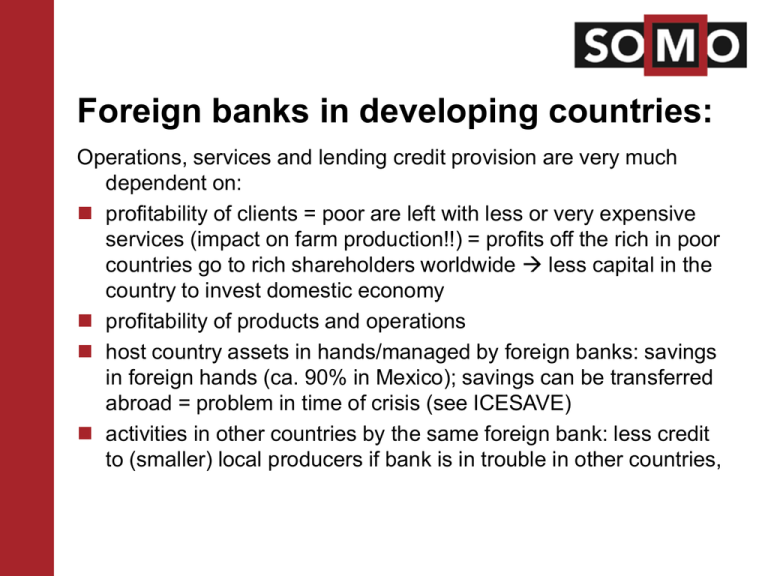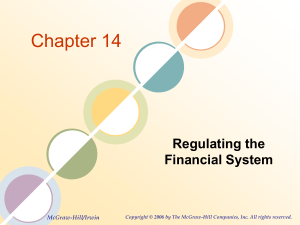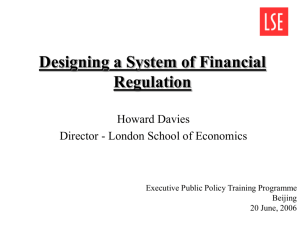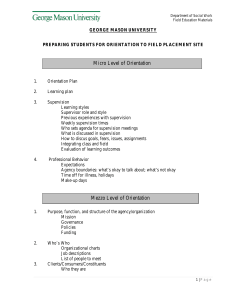Dia 1 - Eurodad
advertisement

Foreign banks in developing countries: Operations, services and lending credit provision are very much dependent on: profitability of clients = poor are left with less or very expensive services (impact on farm production!!) = profits off the rich in poor countries go to rich shareholders worldwide less capital in the country to invest domestic economy profitability of products and operations host country assets in hands/managed by foreign banks: savings in foreign hands (ca. 90% in Mexico); savings can be transferred abroad = problem in time of crisis (see ICESAVE) activities in other countries by the same foreign bank: less credit to (smaller) local producers if bank is in trouble in other countries, Foreign banks and risks regulation and supervision of new complex financial products and operations might be inadequate in developing countries host supervisor and regulator and monetary policy are loosing sovereignty offering financial products that are risky or include important capital transfers abroad competition from foreign banks can lead to: ■ risky behaviour and lending by domestic banks as well as foreign banks themselves (e.g. Asian crisis was caused a.o. because of foreign banks competing for market shares were providing risky lending) = fragile financial operators who that are easily affected by financial crisis ■ more and more mergers and acquisitions among domestic banks (consolidation, is happening in Brazil now (Itau + Unibanco)) = banks become too big to fail Basel II might result in developing country banks being less competitive, making them more vulnerable to foreign take-overs Speculation by foreign banks against host country currencies (e.g. in Uganda, in relation with issuing of bonds) INSTITUTIONS - impacts on financial markets and regulation World Bank and IMF Loan conditionalities: Obligation to privatise state banks Liberalisation of the capital account and foreign currency transactions Liberalise interest rates …. IMF After the Asian financial crisis in 1997-1998 (considered to be caused by lack of regulation and independent supervision/‘crony capitalism’) set up different programmes to improve financial regulation and supervision in developing countries : ■ The Financial Sector Assessment Programme (FSAP) ■ The Financial Sector Reform and Strengthening Initiative (FIRST) change regulation and supervision in developing countries, based on neo-liberal thinking REGULATION & SUPERVISION Home supervisors of banks are responsible for branches abroad Home and host supervisors are supposed to work together in host countries regarding affiliates abroad of banks No central supervision of international financial conglomerates and their transactions No binding regulation at international level to be implemented by the international financial operators or to be imposed on the latter by governments where they are operating. International voluntary standard setting and discussing committees related to banking, insurance and supervision : many developing countries do not participate or do not have the means to implement the standards International standard setting organisations: Basel Committee on Banking Supervision (BCBS): http://www.bis.org/bcbs/index.htm Basel II = capital reserves and risk management standards principles of effective banking supervision International Association of Deposit Insurers (IADI): http://www.iadi.org International Association of Insurance Supervisors (IAIS): http://www.iaisweb.org International Organisation of Securities Commissions (IOSCO): http://www.iosco.org Committee on Payment and Settlement Systems (CPSS): http://www.bis.org/cpss/ CPSS-IOSCO Task Force on Securities Settlement Systems: http://www.bis.org/cpss/index.htm; http://www.iosco.org International Accounting Standards Board (IASB): http://www.iasc.org.uk International Auditing and Assurance Standards Board (IAASB): http://www.ifac.org International organisations with no standard setting goals include Committee on the Global Financial System: http://www.bis.org/bcbs/index.htm Financial Stability Forum: http://www.fsforum.org/ Markets Committee: http://www.bis.org/about/factmktc.htm Irving Fisher Committee on Central Bank Statistics: http://www.bis.org/ifc/index.htm Some cooperation among the international financial bodies through joint discussing committees such as for instance: The Joint Forum CPSS-IOSCO Task Force on Securities Settlement Systems BCBS Transparency Group and IOSCO TC Working Party on the Regulation of Financial Intermediaries !? Who takes care at international level that banks and financial conglomerates do not become too big to fail? The current crisis sees more mergers and acquisitions whereby some financial conglomerates become even bigger!? “Seems they all want to become too big to be allowed to fail” …. TREATIES The OECD Code of Liberalisation of Capital Movements Nice Treaty BITs: A broad definition of investment Non-discrimination principles Fair treatment Freedom of capital movements Expropriation rules and compensation Investor-to-state dispute settlement and state-tostate dispute settlement Relation with crisis: the measures which Argentina took during its financial crisis (devaluation etc.) have been disputed by many investors = more than 30 cases before ICSID which might cost Argentina more than US$ 80 bn if it looses all the cases. GATS problematic aspects of how the financial services are being dealt with: Liberalisation of risky and unstable financial services Deregulation rather than securing proper regulation Attacking prudential regulations Uncontrolled liberalisation GATS liberalises capital flows [1], [2] GATS undermines undemocratic processes and meeting the needs of societies The reason why the GATS agreement and GATS negotiations are so imbalanced to the interests of the financial services industry is because they are heavily influenced by the financial services lobby. This financial lobby is behind the proposal during the Doha Round the GATS negotiations on domestic regulation to include a rule whereby foreign service suppliers should be allowed to give comments before legislation is adopted in parliament. However, foreign companies already have much influence on legislation in host countries. The new GATS rules would not provide guarantees, regulation or means to protect that other stakeholders in the host country such as customers, workers etc. [1] Art. XI to GATS: also applies to any services sector whose liberalization is being committed under the GATS agreement. [2] Art. XVI , foonote 8: also applies to any services sector whose liberalization is being committed under the GATS agreement. FTAs Free trade agreements (FTAs) result in more unrestricted capital flows and financial services : GATS ‘plus plus’ EU wants to include international standards in FTAs, which are not negotiated by developing countries Worrying restrictions to control capital flows: ■ prohibit restrictions on all payments for current transactions between residents of the signatory countries, ■ prohibit restrictions on the free movement of capital relating to direct investments with regard to transactions on the capital account of balance of payments, ■ to require that measures ensuring the integrity and stability of a Party's financial system shall not be more burdensome than necessary to achieve their aim, and shall not discriminate against financial service suppliers of the other Party in comparison to its own like financial service suppliers,, ■ to limit the ways safeguard measures with regard to capital movements can be taken: only “in exceptional circumstances” when payments and capital movements between the Parties cause or threaten to cause serious difficulties for the operation of monetary policy or exchange rate policy in one or more [signatory States]; and only those safeguard measures with regard to capital movements “that are strictly necessary may be taken” for a period not exceeding six months. POLICIES: SOME CRISIS RISKY STRATEGIES Lisbon Strategy and “Global Europe – competing in the world” = strategy supporting competitiveness and world wide expansion of European banks and their financial products and operations lobby against too costly regulations and supervision incentive to allow banks / financial conglomerates to become larger and larger competing regulators and supervisors to makes a country’s financial industry and financial markets most profitable = lack of cooperation and supervision on cross border financial conglomerates CURRENT MEASURES PROPOSED within EU Increasing capital requirements for banks (reserves) Enhancement and EU harmonisation of deposit guarantee system Regulation of credit rating agencies Tackling (too high) remuneration that leads to too much risk taking by management Clarification of state aid Improving cross-border financial conglomerates Improving transparancy and reporting by financial services providers Changing accounting standards so as to avoid too much changing of value of assets Enhancing requirements for securitisatio EU INSTITUTIONS EU has a mandate to regulate not to supervise The ECB has no mandate to supervise but has advisory role on regulation in different Council, EC and EP bodies The ECB has the mandate to ensure capital flows and in preserving financial stabilit, in cooperation with the European System of Central Banks (ESCB) which is composed of the ECB and of the central banks of all the EU member states The Eurogroup dealing with the EU meets separately EU DECISION MAKING ON EU REGULATION The EC (DG Markt) has mandate to propose a regulatory measure (Directive or Regulation), in practice often after discussions at Council but seldom after a report by the EP The Council of Ministers of Finance (ECOFIN, assisted by Economic and Financial Committee (EFC)) and EP have codecision powers on the proposed regulation The EC is responsible for transposition and implementation by the member states EC is assisted by different Committees with representatives from member states and ECB, and by many expert consultations mainly composed by business DG Competition has not fully intervened to prevent financial conglomerates to become ‘ too big to fail’ bail outs necessary has to decide whether not illegal state aid Advisory bodies with member state representatives, in the Lamfalussy process Regulatory committee or Level 2 Committees: ■ European Banking Committee (EBC) ■ European Insurance and Operational Pensions Committee (EIOPC) ■ European Securities Committee (ESC) Committee of Supervisors or Level 3 Committees: ■ Committee of European Banking Supervisors (CEBS) ■ Committee of European Insurance and Occupational Pension Supervisors (CEIOPS) ■ Committee of European Securities Regulators (CESR) PROBLEM: IMPLEMENTATION AND SUPERVISION EU member states do not always properly implement (transpose) EU regulation EU member states have mandate of supervision, which not always do supervision properly or do not take into account EU dimension No proper transborder supervision of transborder financial conglmerates in different EU member states > Competition among member states to support their financial industry weakens regulation and supervision > Different traditions, legislation and structures of supervision Problem of cooperation Voluntary MoU between supervisors Since 1 June 2008, there has been a voluntary Memorandum of Understanding on cooperation between the financial supervisory authorities, central banks and finance ministries of the Euroopean Union – on cross border financial stability: signed by 118 institutions in 27 EU member states and by the ECB not abided by during September 2008 crisis > Competition among member states to support their financial industry Developing countries have problems to address the supervisors of EU financial conglomerates EU ROLE IN THE WORLD Aggressive agenda to liberalise financial services and capital movements in developing countries through GATS and FTAs, without caring about sufficient regulation and supervision > DG Trade Member states not represented as a single body or by all individual member states in international standard setting bodies, and forums discussing financial stability such as FSF, G-20 …. IMPACT OF EU POLICIES, REGULATORY & SUPERVISORY STRUCTURE Too much competition among member states leads to too weak regulation and supervision Credit crisis and buying & selling of risky products, which affects developing countries Conflict of interest in EU with impact among the world: making EU financial industry competitive by becoming larger, expanding in developing countries with risky behaviour, while not guaranteeing due regulation and supervision Too much influence by resourceful financial industry lobby, and too little monitoring and interference by civil society and parliaments. too little concerns about access by poorer clients, sustainability of financing and impact on developing countries (e.g. lack of regulation of credit rating agencies




